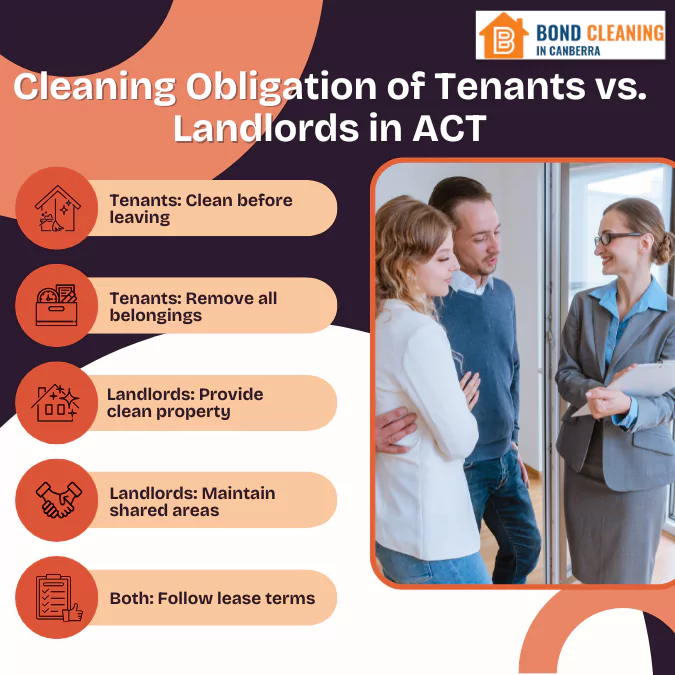
Landlord Rights vs. Tenant Cleaning Obligations in ACT
“Tenants must return the property cleaner than they found it.” It’s a phrase many landlords believe and many tenants fear, but it’s not quite true in the state of ACT. The law here draws a clearer and fairer line. It defines exactly what a “reasonably clean” rental property really means for both sides. According to the Residential Tenancies Act 1997 (ACT), unless otherwise noted at the beginning of the tenancy, tenants must vacate the property in a reasonably clean state rather than in a “perfect” or professionally cleaned state. Cleaning is a shared, not a one sided, job, and landlords are required to make sure the property is clean and ready for habitation before a new tenant moves in.
This article will unpack the cleaning obligations of both landlords and tenants in ACT, helping you understand what the law expects and what it doesn’t. Whether you’re preparing for a routine inspection or the end of your tenancy, knowing your rights can prevent unnecessary disputes from taking place. For those of you preparing for a move out, hiring a professional end of lease cleaning Canberra service can also help ensure you meet your obligations and secure a smooth bond return.
Hide
Show
- The Starting Point: Clean at Handover
- During the Tenancy: Who Does What?
- What Does ‘Reasonably Clean’ Mean?
- Fair Wear and Tear vs. Damage or Dirt
- Bond Deductions: Truth and Misunderstanding
- The Professional Cleaning Question
- Infographic: Cleaning Obligation of Tenants vs. Landlords in ACT
- Wrapping Up
1. The Starting Point: Clean at Handover
Tenant: Some tenants believe that if the home wasn’t spotless when they moved in, they can leave it the same way. Not true. Even if the property wasn’t perfectly clean, the tenant must still return it in a “reasonably clean” condition relative to its condition at the start. The entry condition report is the tenant’s best defence and guide for how to leave the home.
Landlord: Before a new tenancy begins, the landlord must ensure the property is in a clean and habitable condition. This means kitchens, bathrooms, carpets and appliances, should be free from visible dirt or grime. A tenant shouldn’t scrub before moving in; cleanliness is the landlord’s legal responsibility.
2. During the Tenancy: Who Does What?
Tenant: The space must be kept “reasonably clean” by the renter for the duration of the lease. This includes, routine cleaning duties like garbage pickup, bench wiping, vacuuming and restroom cleaning. Regular upkeep helps avert future disputes and prevents harm.
Landlord: Some landlords believe that tenants are also responsible for keeping external windows and gutters clean, even if they are located several levels above the ground. In reality, landlords (or agents) are responsible for areas beyond reasonable tenant reach or control. A leaking roof that is causing mould, for instance, is the landlord’s problem and not the tenant’s fault.
3. What Does ‘Reasonably Clean’ Mean?

Tenant: At the end of the lease, tenants must leave the premises in a “reasonably clean” state; not necessarily in a professionally cleaned state. “Reasonable” takes into account the property’s age, prior condition and normal wear. If the carpets were ten years old when the tenant moved in, they can’t be expected to look new after a vacuum.
Landlord: A common misconception is that tenants must pay for professional cleaning automatically. Unless the tenancy agreement clearly requires it and the property was professionally cleaned before moving in; the tenant only needs to achieve a comparable standard of cleanliness. That said, engaging an end of lease cleaning Canberra service is a practical choice for tenants who want to meet that standard confidently.
4. Fair Wear and Tear vs. Damage or Dirt
Tenant: The ACT law clearly distinguishes between, what is fair wear and tear and damage or neglect. Tenants, are not responsible for signs of typical ageing, like worn door handles, tiny carpet frays and fading paint.
Landlord: For natural wear, some landlords attempt to collect bond money. However, the ACT Civil and Administrative Tribunal (ACAT) has regularly ruled that landlords, can only charge renters for actual damage brought on by overuse or dirty areas, not for normal wear and tear. Tenants are required to clean the area or pay the landlord for repairs, if the level of dirt or damage exceeds expectations.
5. Bond Deductions: Truth and Misunderstanding
Tenant: Many tenants believe landlords can withhold bond money simply because they prefer a higher level of cleanliness. Not true. Bond claims must accurately reflect the costs or work required to restore the property to its predamage state. Tenants are more likely to get their bond back if they can provide proof of professional cleaning receipts or before and after pictures.
Landlord: A landlord may deduct cleaning expenses from the bond, if a tenant leaves the property in a state of uncleanliness that exceeds acceptable bounds. Evidence is essential; thorough condition reports and dated images can help prove claims.
6. The Professional Cleaning Question
Tenant: Legally, professional cleaning is not necessary, unless specified in the lease or the property was cleaned by a professional at the beginning. However, it’s usually a wise investment, for large homes or tenants with little free time. From oven trays to skirting boards, a thorough cleaning from a reputable end of lease cleaning Canberra firm can guarantee that every area satisfies acceptable requirements.
Landlord: Landlords sometimes assume professional cleaning is always the tenant’s duty. The ACT legislation doesn’t support this view unless there’s clear written evidence and fairness in the condition comparison. The emphasis remains on “reasonably clean,” not “professionally pristine.”
Infographic: Cleaning Obligation of Tenants vs. Landlords in ACT

Wrapping Up
In the ACT, cleaning obligations rest on one principle: fairness. When both sides understand their true obligations, disputes fade quickly. By relying on solid evidence, transparent communication, and when needed a professional cleaning service, both landlords and tenants can part ways on good terms and with their bond intact.

